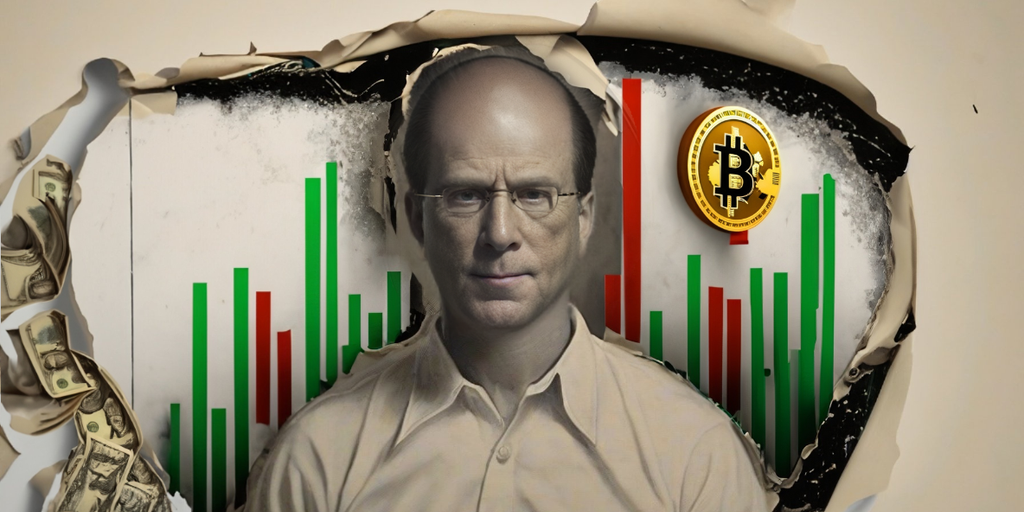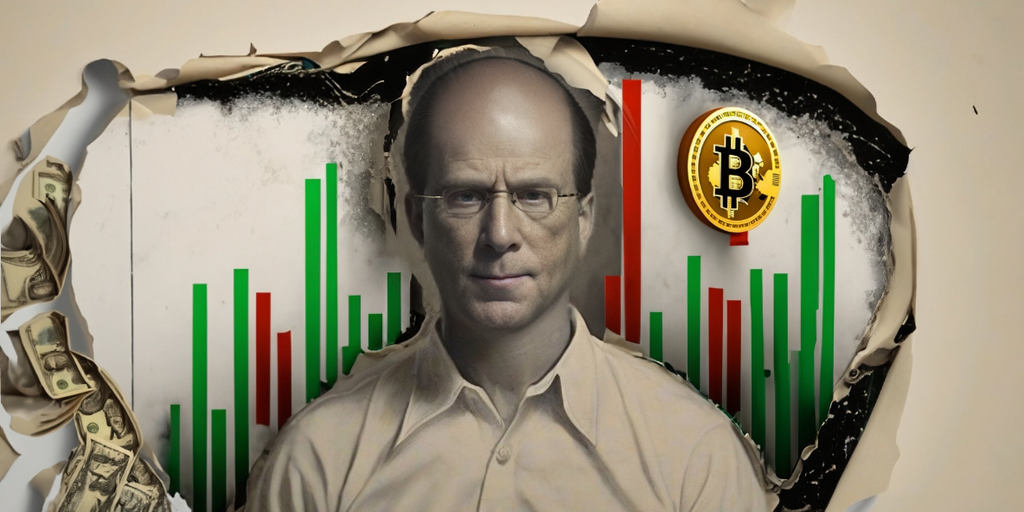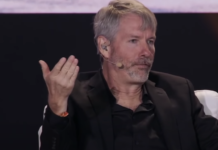
No topic has done more to bring hope to the crypto faithful in 2023 than the prospect of a spot Bitcoin ETF—and no one person has done more to make that dream a reality than BlackRock CEO Larry Fink.
A Bitcoin ETF, which could open the floodgates for billions worth of institutional assets to flow into the market, has eluded crypto investors for more than a decade. It’s been the most highly anticipated event in crypto since Decrypt was founded in 2018. But following rejection after rejection from the SEC, citing the potential for manipulation in the Bitcoin market, it had been mostly written off as a lost cause. Then Fink and BlackRock changed the game—and in dramatic, completely unexpected fashion.
In June, BlackRock shocked the crypto world when it put its Wall Street weight behind a Bitcoin ETF, filing an application with the SEC for its iShares Bitcoin Trust. Fink then began singing Bitcoin’s praises to mainstream audiences on national television. The Bitcoin ETF odds instantly changed.
But Fink wasn’t always so bullish—and his evolving relationship with crypto and what this could mean for the market is why he is Decrypt’s Person of the Year.
It wasn’t so long ago, after all, that Fink had dismissed Bitcoin as an “index of money laundering.” But we shouldn’t get hung up on comments from 2017, says Adam Cochran, a partner at Cinneamhain Ventures and business professor.
The crypto industry ought to applaud the fact that BlackRock is now willing to stake its reputation on “diving in early to this space,” Cochran told Decrypt. “And then not put [Fink] on a pedestal,” he said.
Who is Larry Fink?
Much of Fink’s early success stemmed from his development of mortgage-backed securities—more than a little ironic given the role that such assets played in the financial crisis of 2008, which itself had a profound impact on early Bitcoin adoption and lore.
Leading up to the crisis, a growing number of mortgage-backed securities were backed by subprime (incredibly risky) mortgages. When borrowers defaulted, the value of these securities tanked. And all the banks and firms that had loaded up on mortgage-backed securities—lured by high interest rates—experienced devastating losses. The crisis caused the collapse of Wall Street giants Lehman Brothers and Bear Stearns, and the acquisition of Merrill Lynch.
Although Bank of America acquired Merrill Lynch’s banking business, it was Fink’s BlackRock that acquired Merril Lynch Investment Managers in a $9.7 billion deal in 2006. That brought the firm’s assets under management to $1 trillion. Three years later, BlackRock paid $13.5 billion for the investment arm of British bank Barclays, bringing its assets to $2.7 trillion.
That acquisition included the iShares collection of index funds. The crypto industry now knows it well because of BlackRock’s iShares Bitcoin Trust and iShares Ethereum Trust applications.
Since 2009, BlackRock has been the largest asset manager in the world. The following year, the Wall Street firm managed or monitored upwards of $12 trillion. It now oversees $8.5 trillion, a sum equal to almost half the earnings of the 2023 Fortune 500 list. The firm is so large that Fink has assumed a CEO of CEOs role, publishing a letter to other chief executives each year. No big surprise that his 2023 letter included a section called “Digital Assets.”
But there’s been some controversy along the way.
For starters, there’s the role that Larry Fink’s BlackRock played in the financial crisis and a message inscribed in the Bitcoin genesis block. Fink’s BlackRock made two of its most critical acquisitions in the aftermath of the crisis. Around the same time, Bitcoin’s pseudonymous creator Satoshi Nakamoto inscribed a line of text in the first ever block of BTC transactions: “The Times 03/Jan/2009 Chancellor on brink of second bailout for banks.”
It’s a headline from the London Times about banks being bailed out by the British government in the wake of the financial crisis. No official explanation was ever offered, but it’s widely believed to underscore the first line of the Bitcoin Whitepaper: “A purely peer-to-peer version of electronic cash would allow online payments to be sent directly from one party to another without going through a financial institution.”
That’s not been lost on Ram Ahluwalia, CEO of Lumida Wealth, an asset manager that specializes in alternative investments and digital currencies.
“Decentralized money is implicitly anti-institutional. And BlackRock is one of the biggest institutions of all, it’s a delicious irony,” he told Decrypt. “The one resolution to all this is that BlackRock is a private institution. It is not a sovereign institution. And BlackRock has a mission to advance the investment objectives of private organizations.”
The company has also fallen afoul of environmental, housing, and diversity and inclusion advocates. Discrimination allegations have been so persistent that, in a bizarre twist, BlackRock now faces complaints that it has wrongfully fired white men and used a “patently illegal” scholarship program to hire candidates from marginalized groups.
Until very recently, Fink was an avowed Bitcoin skeptic. Even as BlackRock tepidly embraced Bitcoin in 2021, its chairman said during a 2021 interview that there’s “very little investor demand” for cryptocurrencies.
Larry Fink’s Bitcoin about-face
Much has been made of the BlackRock CEO and chairman’s about-face on Bitcoin.
Mark Connors, head of research at crypto asset manager 3iQ, told Decrypt that Fink’s embrace of the world’s largest and oldest peer-to-peer cryptocurrency is “a full-throated endorsement.”
He was referring specifically to Fink’s comments on Fox Business that Bitcoin was “digitizing gold.”
3iQ has offered a spot Bitcoin ETF to Canadian investors since June 2021. As of November, the fund—which trades on the Toronto Stock Exchange under the BTCQ ticker—had $160 million assets under management. But 3iQ is getting in position to race down the road that Fink is paving.
He calls BlackRock’s pursuit of a spot Bitcoin ETF a “coordinated effort to pave the way for a properly onboarded process to institutionalize Bitcoin, safely, and in support of a regulatorily compliant manner.” It’s almost as if the firm wants to “provide breadcrumbs for the SEC,” Connors added.
3iQ isn’t alone on the starting line. European digital asset manager CoinShares has gone a step further, acquiring the option to buy Valkyrie’s ETF business. The deal even gives Valkyrie permission to put CoinShares’ name on its Bitcoin ETF application.
“Institutions that were exploring this and nibbling at it feel more justified in going to their internal investment committees and risk controllers and saying, ‘Let’s dive in a little more here,’” Cochran explained. “So if they were already on that edge, Larry Fink kind of gives them the nudge, to say, ‘Hey, look, this isn’t totally crazy.’”
The industry is so optimistic about a Bitcoin ETF approval that prices have soared, and Crypto Twitter has been set ablaze by administrative updates and false alarms.
Case in point: The price of Bitcoin spiked 10% when a false report claimed that BlackRock’s Bitcoin ETF bid had been approved. Fink was asked by Fox Business about the false report and ensuing market moves. “It’s just an example of the pent-up interest in crypto,” he said during the interview. “I think the rally today is about a flight to quality.”
Up Next: January 10
That pent-up interest will have to wait a bit longer.
So far, the SEC has twice given itself an extension to make a decision on the iShares Bitcoin Trust application. Just last week, BlackRock filed another amendment that showed signs the securities regulator has had extensive talks with the asset manager about risks, disclosure to potential investors, and what will happen to the Bitcoin BlackRock has purchased if the trust needs to be dissolved.
Analysts at JP Morgan have said there’s a 90% chance a Bitcoin ETF gets approved before January 10. Grayscale published a blog post repeating what it’s said before that an approval will be a “matter of when, not if.” And Coinbase CEO Brian Armstrong, although he’s made much of the crypto exchange’s growth in other countries, told Decrypt recently that he’s “pretty optimistic” about an approval.
Bloomberg Intelligence ETF analyst James Seyffart said recently that while the window for a decision on a handful of applications is technically from January 5 through January 10, the securities regulator is unlikely to make an announcement on a Friday and even less likely to drop news about the ETF applicants over the weekend.
So that shrinks the window to Monday, January 8 through Wednesday, January 10. “Mark your calendars people,” he wrote on Twitter.
Window is officially Jan 5th to Jan 10th. Really this means that any potential approval orders are going to come on either Monday Jan 8, Tuesday Jan 9, or Wednesday Jan 10. Mark your calendars people. https://t.co/8ob8Y6pgU5
— James Seyffart (@JSeyff) December 1, 2023
Now, there’s little left to do but wait. But having what many consider to be the best chance for a U.S. Bitcoin ETF approval tied to the world’s largest asset manager makes for an interesting inflection point.
“It creates strange bedfellows,” Ahluwalia said, “forcing people to rethink their core assumptions around whether they want to be a maximalist around a core principle or whether they want to drive adoption.”
Andre Beganski contributed to this report.
Edited by Guillermo Jimenez and Andrew Hayward








